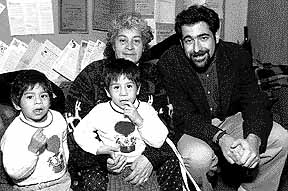From the Princeton Weekly Bulletin, February 9, 1998
Helping area immigrants

![]() History
graduate student wins International Center service award
History
graduate student wins International Center service award
By Caroline Moseley
Paul Kramer, graduate student in history, received the International Center's first International Service Award for his work on behalf of Princeton's Latino immigrants.
Kramer is founder of the campus-based Princeton Immigrant Rights League, known as Apoyo, and cochair of the town-gown Latin American Task Force.
The award, given to an undergraduate, graduate student or student organization whose endeavors "significantly promote international understanding," is funded by the United Moms' Charity Association, an organization established by Chinese-American mothers who live in the Princeton area, with membership open to all. Kramer was nominated for the award by Community House Director Marjorie Young.
Profound culture shock
Kramer came to Princeton in 1992 after spending a year in rural Costa Rica investigating folk medicine as a Fulbright Fellow. At Princeton, he experienced "profound culture shock," largely because he felt "disconnected from a community." He began teaching English as a Second Language (ESL) through Community House, working for the most part with immigrant Guatemalan day laborers.
"In graduate school you're very absorbed in your professional work," he explains. "While this is clearly important, it made me feel somewhat selfish and self-indulgent." In addition, "When all your ideas are challenged, as they are in graduate school, you begin to feel you don't have a lot to offer. Teaching ESL gave me a sense that I had something to give back to the community."
With his ESL students, Kramer says, "We studied the usual things--numbers, colors, how to tell time." Soon, however, "They began to ask me substantive questions, like `How do I tell my boss I need a lunch break?' `How do I ask the landlord to fix the stove?' `Can you help me translate a letter asking where my paycheck is?' I began to realize the Latino community in town faced huge problems that were largely invisible to students and to the larger Princeton community."
Apoyo means support
In 1994 Kramer helped organize the Coalition Against Proposition 187--legislation proposed in California to limit benefits to illegal immigrants. "We had a big rally on Firestone Plaza," Kramer recalls. "There were about 500 people who agreed that the contribution of immigrants to American society needed to be recognized."
The coalition was the forerunner of Apoyo ("the name in Spanish means `support,'" says Kramer). This student group, operating under the umbrella of Community House, is dedicated "to defending the rights of immigrants in the Princeton area and the nation at large." Working with other volunteer, political and religious groups in Princeton, Apoyo has "held workshops to help immigrants protect their rights in education, housing and the workplace; supported ESL programs; performed translation services; and lobbied against anti-immigrant legislation."
Kramer and about 10 other Apoyo members are currently engaged in collecting oral histories from local immigrants, thanks to a grant from the N.J. Committee for the Humanities and the cooperation of Community House, which submitted the proposal with Kramer.
"We're compiling memoirs that we will publish in English and Spanish in facing columns," he says. "We like to think it's an example of how these stories become richer and more available in two languages, sharing a single page." The resulting volume will "be illustrated with individual and family photographs--only with permission of the subjects, of course."
Kramer has also been an active member of the community-based Princeton Latin American Task Force, which he cochairs with International Center volunteer Hana Kahn. The task force is a coalition of organizations such as the Mercer County Hispanic Association, the Interfaith Council, Apoyo, and interested individuals such as "nurses, translators, ESL instructors and social workers."
The task force "mostly does community service work, such as sponsoring an annual health fair and clothes drive."
Targeting abusive landlords
Kramer and the task force have made a special effort to improve housing for immigrants in Princeton. "High rents mean that immigrants have to divide up apartments to make them affordable," he says. "But the borough's response to overcrowding was frequently to force immigrant tenants out, splitting up families, without dealing with underlying problems of rent-level and housing availability. The community is willing to build houses for the new young middle class working in area financial services and pharmaceutical industries," he believes, "but not for the workers who make those homes and businesses tick."
He quotes a common complaint of his Latino friends and neighbors: "Princeton nos quiere como trabajadores, pero no como vecinos" ("Princeton wants us as workers but not as neighbors").
Now, partly because of task force efforts, he says, "The local government is taking affordable housing more seriously and targeting abusive landlords, though many problems still remain."
Hopkins graduate
A 1991 graduate of John Hopkins University with bachelor's and master's degrees in humanistic studies, Kramer has written his dissertation on U.S. occupation of the Philippines, 1898-1916. Managing academic responsibilities along with his responsibilities to the Latino community and the organization he founded has been "a real juggling act," he says. Nevertheless, he is teaching a spring semester course offered by the Department of History and the American Studies Program, "The United States in the Atlantic World, 1750-1990."
Kramer will leave Princeton at year's end to find a job teaching American history. When he returns to visit, he hopes "to see Princeton residents and University students recognize their obligations to the immigrant community whose labor in homes and restaurants, construction and landscaping, builds the very foundation of the place we live."
Those interested in the work of Apoyo can learn more at http://www.princeton.edu/~apoyo or contact Kramer at pakramer@princeton.edu.